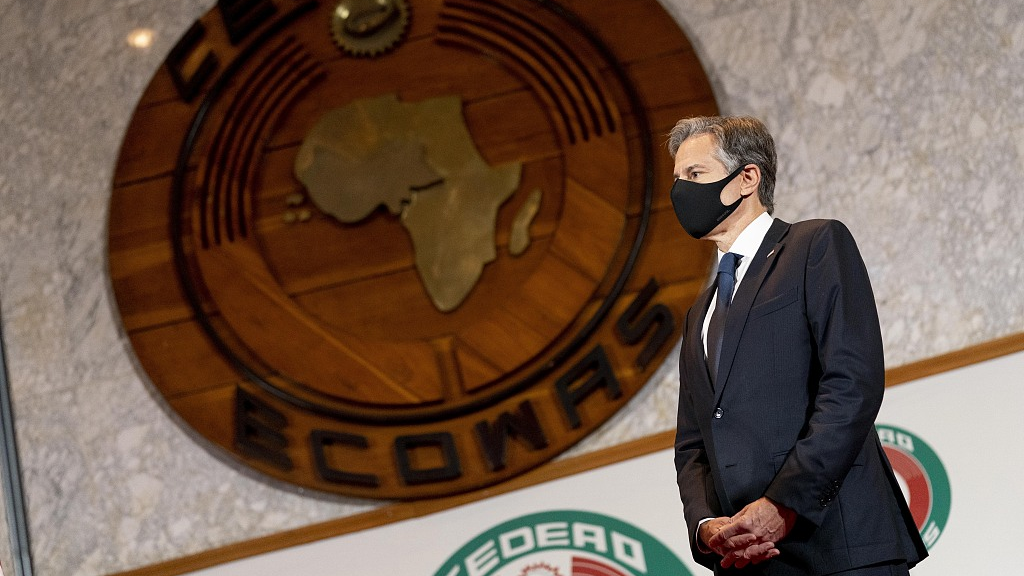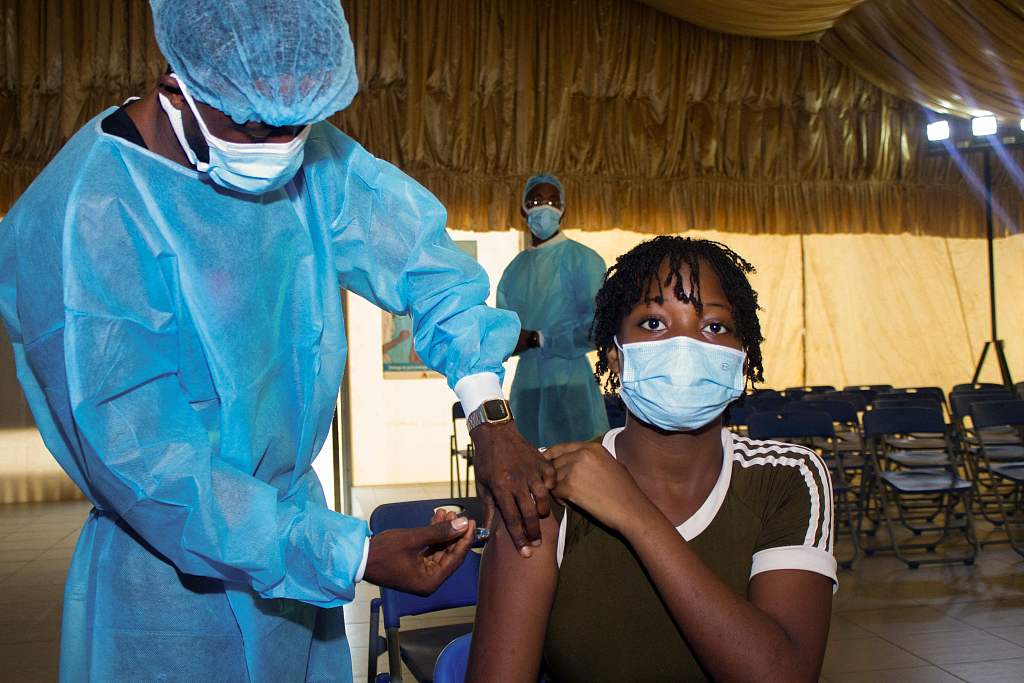
Secretary of State Antony Blinken takes the stage to give a speech on U.S. Africa Policy, November 19, 2021./CFP
Secretary of State Antony Blinken takes the stage to give a speech on U.S. Africa Policy, November 19, 2021./CFP
Editor's note: Hamzah Rifaat Hussain, a former visiting fellow at the Stimson Center in Washington and former assistant researcher at the Islamabad Policy Research Institute, is a TV anchor at Indus News in Pakistan. The article reflects the author's opinions and not necessarily those of CGTN.
The United States continues to embark on a diplomatic spree by calling on other sovereign states to align their foreign policies with its priorities. The African continent is the latest such target as the Biden administration is expecting all nations on the continent to toe the Western narrative on the crisis which disregards objectivity and the central role of neutrality in foreign policy making.
The truth is that the Ukraine crisis requires a swift diplomatic resolution with all sides exercising restraint but the U.S. is adamant that a tougher stance on Russia must be universally accepted. In regions such as Africa, this is yet another example of American administrations pursuing their own parochial interests at the cost of strategic wisdom.
As per U.S. diplomats, Washington is expecting a tougher approach to Russia from African states while concomitantly seeking to lessen the economic effects from the conflict on the continent with the International Monetary Fund and the World Bank. American Ambassador to the African Union Jessica Lapenn said that the United States welcomes the opportunity of partnering with countries such as Senegal on responses to Russian "aggression" and address the implications of it globally.
There exists a misguided expectation in Washington that the entire continent which consists of diverse economic systems, beliefs, political orientations and foreign policy priorities will bandwagon with the American Cold War narrative instead of persisting with calls for de-escalation while searching for a diplomatic solution to the crisis.
The day the war began, the African Union adopted a principled stance which called on Moscow to respect international law and the fact that such statements do not suffice with the U.S. clearly demonstrates the Biden administration's intention for alliance building without principles.
Such an approach which follows Secretary of State Antony Blinken's visit in November 2021 can be characterized as yet another foreign policy blunder. Firstly, Russia's conflict with Ukraine has divided the continent with many countries choosing non-alignment and non-interference instead of active involvement.
Secondly, countries such as Senegal which import 57 percent of wheat from both Russia and Ukraine abstained from the United Nations General Assembly vote on March 2, 2022 which demanded a Russian ceasefire in Ukraine. While it is true that Senegal also voted in favor of a resolution demanding that Moscow end the war 20 days later, this starkly differs from American calls of aggressive responses in a continent which the Biden administration has so far neglected since assuming power in 2021.
Note that at the G5 Sahel meeting involving conflict torn countries such as Chad, Niger, Burkina Faso, Mali and Mauritania in 2021, Secretary of State Antony Blinken only gave five minute pre-recorded remarks in contrast to French President Emmanuel Macron and Blinken's Russian counterpart. The meeting was convened to discuss lingering security concerns in the Sahel such as Al Qaeda and the Islamic State establishing safe havens in the region.
Furthermore, Africa as a priority has fallen victim to disproportionate attention paid to NATO build ups, militarization of the South China Sea and alliance building by the U.S. which has failed to resolve the collapse of Somalia, violence in Ethiopia and heated tensions between Sudan and Egypt.

A nurse (L) administers a dose of the Pfizer/BioNTech vaccine against COVID-19 to a teenager at the Cultural Paz Flor event in Luanda, December 16, 2021. /CFP
A nurse (L) administers a dose of the Pfizer/BioNTech vaccine against COVID-19 to a teenager at the Cultural Paz Flor event in Luanda, December 16, 2021. /CFP
American diplomacy has also misfired on the inoculation front in the continent. As per human rights organizations which are often cited by Washington to demonize China, Sub Saharan Africa witnessed millions of people being denied vaccines with widening income inequalities enabling human suffering.
In 2021, corporations such as Pfizer and Moderna had projected profits worth $54 billion of which less than 2 percent was supplied to low income or least developed countries of which the majority are in Africa. Yet despite these harrowing realities, the U.S. continues to persist with pressurizing tactics while issuing diktats despite the apparent lack of traction of such approaches on the continent.
In March 2022, South Africa's Ambassador to the UN, Mathu Joyini censured the U.S. for violating the UN Charter which has historically resulted in humanitarian fall outs, mirroring previous interventions in Iraq. It is also important to note however, that all African states except Eritrea condemn violence and have asked for all sides to de-escalate at the same time.
Yet the Biden administration continues to seek much more from Africa and it can be rest assured that calls for stronger responses from countries pursuing objectivity and neutrality on Ukraine will only backfire.
(If you want to contribute and have specific expertise, please contact us at opinions@cgtn.com. Follow @thouse_opinions on Twitter to discover the latest commentaries in the CGTN Opinion Section.)

